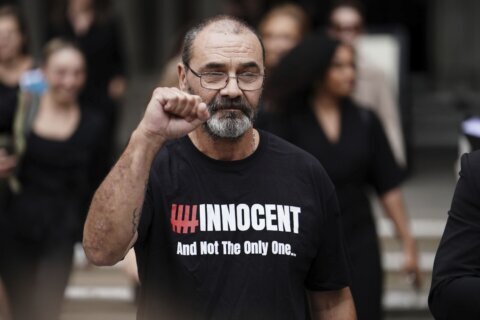WASHINGTON (AP) — The White House announced Thursday that it will impose sanctions against key defense companies and people who “perpetuate violence” in Sudan as the warring sides failed to abide by a cease-fire agreement in the northeastern African nation.
New visa restrictions apply to officials from the Sudanese Armed Forces and the Rapid Support Forces and leaders from the former government led by Omar al-Bashir who are “responsible for, or complicit in, undermining Sudan’s democratic transition,” according to the State Department.
President Joe Biden on May 4 laid the groundwork for the penalties when he issued an executive order that expanded U.S. authorities to respond to the violence and help bring an end to the conflict.
“These measures are intended to hold accountable those responsible for undermining the peace, security, and stability of Sudan,” White House national security adviser Jake Sullivan said in a statement.
The Treasury Department said in a statement that four companies were designated: Al Junaid Multi Activities Co. Ltd., which is controlled by RSF Commander Mohamed Hamdan Dagalo and his brother, RSF Deputy Commander Abdul Rahim Dagalo; United Arab Emirates-based Tradive General Trading LLC, a front company controlled by RSF Major Algoney Hamdan Dagalo, who also is a brother of the RSF commander; Sudan’s largest defense company, Defense Industries System; and the arms company Sudan Master Technology, which is linked to the SAF.
Tradive has purchased vehicles for the RSF that have been retrofitted with machine guns and been used to patrol the streets of Sudan. Al Junaid, also known as Algunade, operates 11 subsidiaries across multiple economic sectors, including the gold industry and has been a vital source of revenue for the Dagalo family and the RFS.
The SAF-connected Defense Industries System has hundreds of subsidiaries that manufacture small arms, conventional weapons, ammunition, and military vehicles. The company uses a complex system to hide its ownership of these subsidiaries and to obtain favorable letters of credit from the Sudan Central Bank and frequently defaults on those loans, according to the Treasury Department.
“Through sanctions, we are cutting off key financial flows to both the Rapid Support Forces and the Sudanese Armed Forces, depriving them of resources needed to pay soldiers, rearm, resupply, and wage war in Sudan,” Treasury Secretary Janet Yellen said. “The United States stands on the side of civilians against those who perpetuate violence towards the people of Sudan.”
It remains unclear how the sanctions will impact either force’s financing or the trajectory of the conflict, now entering its seventh week. The Biden administration says it is coordinating with the African Union, Saudi Arabia and others in the region, trying to press both parties to end the conflict.
Kholood Khair, the founder and director of Confluence Advisory, a think tank in Khartoum, Sudan’s capital, said the sanctions will need the support of other regional stakeholders.
“The U.S. was likely motivated to act because repeat violations are undermining its clout, globally,” Khair said.
Late Thursday, the United States and Saudi Arabia suspended peace talks that had been taking place in the Saudi city of Jeddah since late May. In a joint statement, the two mediating countries said “the decision comes as a result of repeated serious violations of the short-term ceasefire and recent ceasefire extension” on Monday.
Sudan’s military had suspended its participation in talks the previous day.
The fighting between the Sudanese military, led by Gen. Abdel-Fattah Burhan, and the Rapid Support Forces, broke out in mid-April. The violence has killed at least 866 civilians, according to a Sudanese doctors group, though the actual toll is likely much higher.
Washington and Riyadh brokered a cease-fire on May 21, to allow for the delivery of humanitarian assistance and restoration of vital services. There have been seven declared cease-fires since the conflict broke out and all have been violated.
The warring generals were the military wing of Sudan’s democratic transition following the ouster of Islamist leader al-Bashir in 2019, before seizing complete power in a coup in 2021. After agreeing to restore the transition, the pair clashed over the terms of RSF’s merger into the army, a disagreement that exploded into open conflict.
According to the U.S.-Saudi joint statement, the countries have told both sides what they need to do to “show a meaningful commitment to the Jeddah talks.” It also said the RSF and the military have privately informed each other of “confidence-building measures they want to see implemented” by the other force before resuming peace negotiations.
Earlier in the week, the U.S. and Saudi Arabia called out both sides for cease-fire violations, accusing the military of continuing to carry out airstrikes and criticizing the RSF for occupying people’s homes and seizing properties.
The fighting has reduced Khartoum to an urban battlefield, with many districts lacking electricity and running water. The conflict has also stoked ethnic violence in the western Darfur region, killing hundreds there.
___
Jeffery reported from Cairo. AP Diplomatic Writer Matthew Lee in Oslo, Norway, contributed to this report.
Copyright © 2024 The Associated Press. All rights reserved. This material may not be published, broadcast, written or redistributed.






